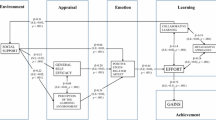Abstract
Logically a relation is expected between time spent on individual study and achievement. The purpose of this study is to examine whether a positive relation exists between the amount of time spent on individual study and academic achievement and whether this differs when using a test measuring short-term knowledge or one measuring long-term knowledge. Data were collected in a problem-based medical curriculum. The results suggest that time spent on individual study correlates poorly with scores on the test measuring short-term knowledge but also with those on the test measuring long-term knowledge. This study reaffirms the complexity of the relationship and it demonstrates the importance to search for qualitative factors about the way students learn.
Similar content being viewed by others
References
Caroll, J.B. (1963). A model of school learning. Teachers College Record, 64, 723–733.
Deynse, N. van., Smet, M., Henderikx, P. & Neve, H. de (1984). Studietijden en studieresultaten bij eerstejaars burgerlijk ingenieur aan de K.U. Leuven. Tijdschrift voor Onderwijsresearch, 9,4, 171–179.
Fredrick, W.C. & Walberg, H.J. (1980). Learning as a function of time. Journal of Educational Research, 73, 183–194.
Gettinger, M. (1985). Time allocated and time spent relative to time needed for learning as determinants of achievement. Journal of Educational Psychology, 77, 3–11.
Gijselaers, W.H. & Schmidt, H.G. (1995). Effects of Quantity of Instruction on time spent on learning and achievement. Educational Research and Evaluation, 1,2, 183–201.
Moust, J. (1993). De rol van tutoren in probleemgestuurd onderwijs: contrasten tussen student-en docent-tutoren [The role of tutors in problem-based learning: contrasts between undergraduate teaching assistants and faculty]. Unpublished Doctoral dissertation, University of Limburg, Maastricht, the Netherlands.
Schmidt, H.G. (1983). Problem-based learning: Rationale and description.Medical Education, 17, 11–16.
Schuman, H., Walsh, E., Olson, C. & Etheridge B. (1985). Effort and reward: The assumption that college grades are affected by quantity of study. Social Forces, 63, 945–966.
Vleuten, C.P.M. van der., Scherpbier, A.J.J.A., Wijnen, W.H.F.W. & Snellen, H.A.M. (1996). Flexibility in learning: a case report on problem-based learning. International Higher Education, 2, 17–24.
Vleuten, C.P.M. van der, Verwijnen, G.M. & Wijnen W.H.F.W. (1996). Fifteen years of experience with progress-testing in a problem-based curriculum. Medical Teacher, 18,2, 103–109.
Author information
Authors and Affiliations
Rights and permissions
About this article
Cite this article
van den Hurk, M., Wolfhagen, H., Dolmans, D. et al. The Relation Between Time Spent on Individual Study and Academic Achievement in a Problem-Based Curriculum. Adv Health Sci Educ Theory Pract 3, 43–49 (1998). https://doi.org/10.1023/A:1009732511707
Issue Date:
DOI: https://doi.org/10.1023/A:1009732511707



